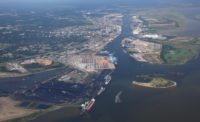The U.S. Army Corps of Engineers is initiating emergency permitting procedures to expedite cleanup in anticipation of oil coming ashore from the April 20 explosion of British Petroleum’s Deepwater Horizon rig about 50 miles off the Louisiana coast.
Corps districts in Alabama, Mississippi and Louisian indicate that they have cut the normally lengthy permitting process to 24-48 hours as authorized under Nationwide Permit 20, which covers those activities subject to the National Oil and Hazardous Pollution Contingency Plan and are performed in accordance with the Spill Control and Countermeasures Plan.
Basically, any oil spill cleanup excavation, dredging or remediation in wetlands or below the water line must be coordinated through each Corps’ district’s regulatory division, says Lisa Coghlan, deputy public affairs officer, Mobile. The activation of NWP20 means the Corps has staff in place to speed up the process so contractors can perform critical work, Coghlan says.
“The unified command (of the U.S. Coast Guard, British Petroleum and Environment Protection Agency) are booming the coast,” Coghlan says. “If the oil does come ashore, we will have impacts to projects along the Mississippi Gulf Coast, as well as dredging, navigation, and environmental.”
Other nationwide permit plans exist for other types of disasters, but the NWP20 has never before been implemented along the Gulf Coast.
The Corps is encouraging contractors and the public to contact regulatory divisions of each district with any questions or concerns about oil cleanup “in the vicinity or in their backyard,” Coghlan says. “It may be covered under a cleaning process already underway under the unified command. That happened a lot after Katrina, that people called us out to do something that would have been covered under other contracts had they coordinated with us.”
Unified incident commands have been established in Mobile, Ala. and St. Petersburg, Fla. to coordinate efforts and determine if a project conforms to the guidelines of NWP20 or may be authorized under other regional or general permitting processes. Contact the UIC, Mobile at: (251) 445-8970 and UIC, St. Petersburg at: (727) 502-8729 or (727) 502-8700.
In addition to NWP20, the NOD has issued a general permit NOD-20 for emergency operations not authorized by NWP20. For more information regarding emergency permitting related to the oil cleanup, contact Pete Serio at: (504) 862-2255 (pete.j.serio@usace.army.mil) or Martin Mayer at (504) 862-2276 (martin.s.mayer@usace.army.mil ).
| Region 1 | Pensacola Permitting Section, Clif Payne (850) 433-8732 |
| Region 2 | Panama City Permitting Section, Kevin O�Kane, (850) 763-0171, ext. 22 |
| Region 3 | Jacksonville Permitting Section, Dale Beter, (904) 232-3502 |
| Region 4 | Cocoa Permitting Section, Irene Sadowski, (321) 504-3771, ext. 12 |
| Region 5 | Tampa Permitting Section, Chuck Schnepel, (813) 769-7060, ext. 7071 |
| Region 6 | Fort Myers Permitting Section, Tunis McElwain, (239) 334-1975, ext. 30 |
| Region 7 | Palm Beach Gardens Permitting Section, Tori White, (561) 472-3517 |
| Region 8 | Miami Permitting Section, Paul Kruger, (305) 526-7185 |





